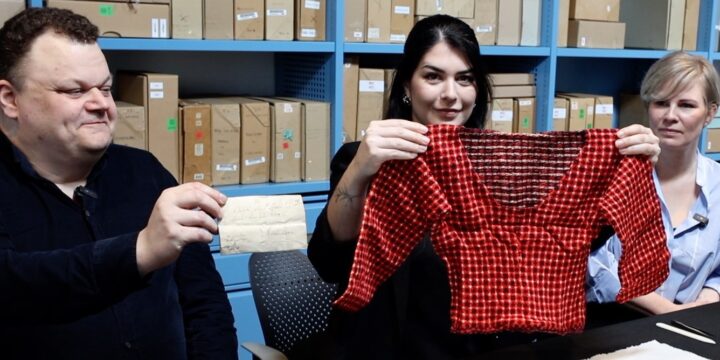
Pristine sweater in parcel posted in 1807

A 200-year-old sweater in a traditional Faroese knit has been found in a stash of 19th-century letters at The National Archives in our Prize Papers collection. The jumper, handknitted in vibrantly coloured fine wool, was intended for a woman in Denmark, but never reached its destination because the vessel on which it was shipped was seized by the British Navy during the Second Battle of Copenhagen.
Associate Prof Erling Isholm, from the University of the Faroe Islands, and Margretha Nónklett, from the country’s National Museum, travelled to The National Archives to see the parcel opened for the first time, 217 years after it was mailed.
The same shipment contained a sample of fine women’s knee length woollen stockings and fabric samples. The export of men’s stockings was a key part of the Faroese economy at this time when ‘wool was gold’ for these island communities.
The red sweater was shipped from Tórshavn on the cargo ship Anne Marie on 20 August 1807 by a carpenter called Niels C. Winther, with a letter saying ‘my wife sends her regards, thank you for the pudding rice. She sends your fiancé this sweater and hopes that it is not displeasing to her.’ The package is addressed to a Mr P Ladsen in Copenhagen and its contents are described by the sender as a ‘sweater for sleeping’, though its style closely resembles Faroese national dress. The note is written in Danish.
Margretha Nónklett said: ‘This is a tremendously exciting find. There are very few pieces like this and we have none with this particular design. It would have been handmade at home with hand-dyed wool.’
Dr Amanda Bevan, of the National Archives, said: ’This is a rare example of a parcel surviving in the Prize Papers, which often contain letters consigned to ships for delivery by sea.’
The Anne-Marie had sailed for Denmark with its captain Jurgen S Toxsvaerd unaware that war had broken out. She was targeted by HMS Defence off the coast of Norway on 2 September 1807, the day the British began bombarding Copenhagen. The British crew boarded the ship, imprisoned Toxsvaerd and his crew and grabbed both the cargo and the ship’s mailbox.
Erling Isholm said: ’The Anne-Marie was one of two owned by the Danish king, who monopolised all trade to and from the islands. If all the contents of this mailbox are here, it represents a quarter of the communication between the Faroes and Denmark in 1807.’
Released later in Copenhagen, Toxsvaerd reported that he was transporting ‘49,000 pairs of woollen stockings, eight tons of dried fish, 100 cases of candles, 250 barrels of tallow, 19 barrels of train oil and 10 barrels of feather’. The cargo value was around 42,110 Danish rix-dollars.
Paper rix-dollars were also found among the letters, with a wad of them wrapped around 18 silver coins, which include Danish skillings dating back to the reign of Frederick III of Denmark, 1648-1670.
There are also two samples of barley being returned to sender with a note complaining about the quality of an earlier shipment: ’Out of 416 barrels of grain sent, 399 have taken some damage’. 25 barrels were so bad they couldn’t sell them, they wrote.
The Prize Papers Project is planning to digitise the letters and the contents of the packages, making them available online in open access. It is part of a wider project to catalogue and digitise the entire Prize Papers collection through a collaboration between The National Archives and the University of Oldenburg in Germany, funded by the Göttingen Academy of Sciences and Humanities in Lower Saxony. Over 20 years, the project will make an estimated 3.5 million document images available online.
Project homepage: https://www.prizepapers.de/
Materiality homepage: https://materiality.prizepapers.de/
Tags: Faroe Islands, knitting, Prize Papers, Second Battle of Copenhagen, textiles, woollen